
Last night, ABC premiered their newest drama to the network's biggest midseason audience since 2010. 13.3 million people tuned in to watch "Resurrection" and, judging by a quick scroll through online message boards, many of them seem to be having trouble distinguishing between this new show and the acclaimed French series called "The Returned", which aired in the U.S. last year on the Sundance channel. This confusion is understandable: both shows are about small towns that are changed forever when the dead start coming back to life. But in fact, the two shows have absolutely nothing to do with each other. So here's a handy guide to telling them apart, despite everything they may appear to have in common.
 Do the "zombies" eat?
Do the "zombies" eat?The main source of confusion between the two shows is that the walking dead in both the American and French versions aren't of the shuffling, brain-munching variety. Instead, the dead come back as fully functioning humans, unaware that they have died and that years have passed since their demise. Even though they may not be rotting or moaning, there are other ways to tell them apart from normal humans. In "The Returned", they don't seem to ever eat or sleep. In "Resurrection", they seem to suffer from intermittent seizures.
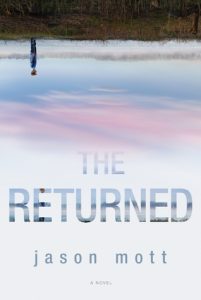 Is it based on a book?
Is it based on a book?Despite an eerily similar concept, both shows are based on totally different source material. The French series is an adaptation of a 2004 French film of the same name, "Les Revenants". The American series is an adaptation of a 2013 novel by author Jason Mott, coincidentally titled "The Returned" (Mott was apparently trying to make things as confusing as possible). ABC changed the name of their adaptation to "Resurrection" specifically to avoid confusion with the French series. (They first called it "Forever" before landing on its current title.)
 Are there subtitles?
Are there subtitles?If everyone is speaking in French and you can only understand what's happening by reading the subtitles at the bottom of the screen, then you're definitely watching "The Returned". This is probably the easiest way to tell the difference.
 Is the first "zombie" a small child?
Is the first "zombie" a small child?Another source of confusion surrounding the two shows is that they both open with a small child, who died in a tragic accident years before, returning to life -- much to the surprise of their respective families. But don't let this confuse you. In "Resurrection", the child is a boy named Jacob, who wakes up randomly in a Chinese rice paddy. In "The Returned", the child is a girl named Camille, who returns to life in the same place where her school bus careened off a cliff years ago.
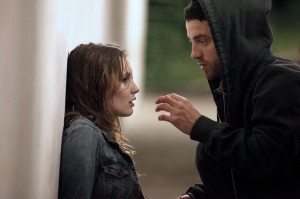 Is there a cannibal?
Is there a cannibal?If one of the "zombies" is a serial killer who attacks women in a tunnel and eats their internal organs, then chances are you're watching "The Returned". The French series takes the concept of dead people returning to life and goes dark with it, focusing on themes of loss, regret, and a general attitude of be-careful-what-you-wish-for. The American series, unsurprisingly, goes a bit more optimistic with the idea, allowing room for themes about hope, faith, and love (although there's still a shadowy figure in a hoodie who's possibly up to no good).
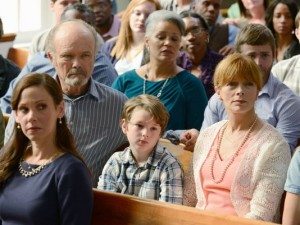 Is everything brightly lit?
Is everything brightly lit?If you can see everything that's happening, then you're watching "Resurrection". The American series prefers the bright, clean look indicative of high production values. If you're having trouble seeing some of the action because the entire show is suffused with oppressively creepy gloom, then you're watching "The Returned". The French show is practically suffocated in atmosphere; its small mountain village is as dark and menacing as the town of Twin Peaks.
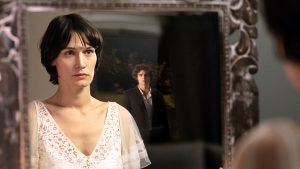 Does the show move at a deliberately languid pace?
Does the show move at a deliberately languid pace?If so, you could be watching either show. Both "The Returned" and "Resurrection" eschew the recent trend of "speed-plotting," preferring to gradually build their characters and lay the groundwork of their central mysteries, rather than packing each episode full of twists and cliffhangers. This may frustrate some viewers, but the slowed-down pace rewards those invested in the shows for the long haul.
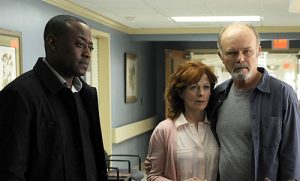 Does the show feature a government official?
Does the show feature a government official?If the series centers on a bewildered immigration agent, then you're watching "Resurrection". Since American audiences can't seem to watch anything that doesn't revolve around a doctor, lawyer, or police officer, the main focus of "Resurrection" -- during its pilot, at least -- is on Agent Martin Bellamy (played by Omar Epps). Bellamy's bosses are unhappy with his decisions surrounding Jacob, so you can bet on further government involvement down the line. "The Returned", on the other hand, chooses to place its focus squarely on the citizens of the town, and how their lives are impacted by the inexplicable events. Sure, some of those citizens happen to be cops, but in their Alpine village, that's just a job title, like schoolteacher or bartender.
If there are naked people on your television screen, then you know you're watching the French series. Come on, you think that stuff would be allowed on primetime ABC? Get real.
Everything make sense now? Good. You're just in time to be confused even more: A&E is reportedly in talks to expand its slate of original programming by developing an English-language version of "The Returned" -- the French series, not the American novel. That's right. This time next year, there may be three shows on the air titled, or based on something titled, or titled and based on something titled, "The Returned". Makes your head hurt, doesn't it?
Did you catch last night's premiere of "Resurrection"? Have you had the chance to watch "The Returned"? Would you watch an American version of "Les Revenants"? Tweet us @Stagebuddy and let us know what you think about each show!